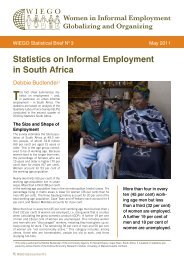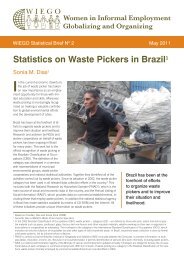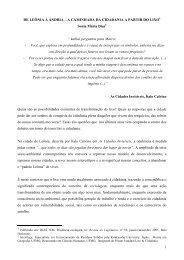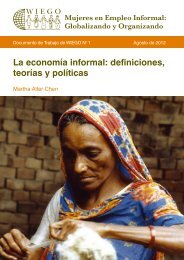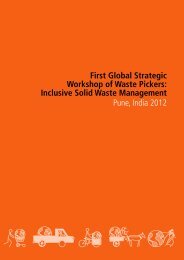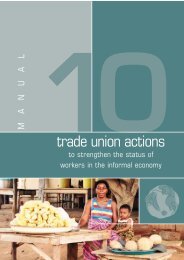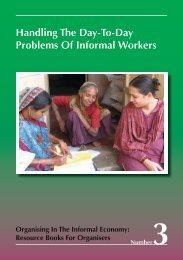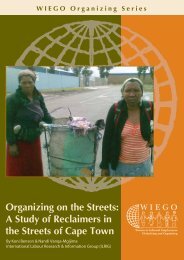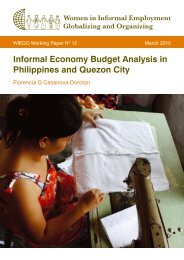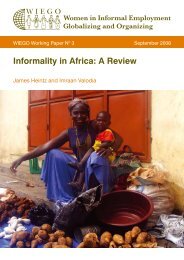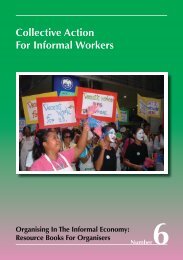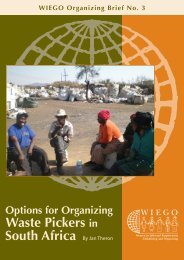Waste Pickers and Carbon Finance: Issues to Consider - WIEGO
Waste Pickers and Carbon Finance: Issues to Consider - WIEGO
Waste Pickers and Carbon Finance: Issues to Consider - WIEGO
- No tags were found...
Create successful ePaper yourself
Turn your PDF publications into a flip-book with our unique Google optimized e-Paper software.
<strong>WIEGO</strong> Technical Brief (Urban Policies) N o 7credits on the voluntary market. As noted by one respondent, carbon credits generated by a waste pickerMBO recycling project with demonstrable social benefits may be more attractive <strong>to</strong> buyers than carboncredits issued by an anonymous industrial facility.Also related <strong>to</strong> commercial viability is how one respondent noted that in order <strong>to</strong> function efficiently, acarbon offset oriented recycling program would require source segregation, meaning that householderswould have <strong>to</strong> sort their waste prior <strong>to</strong> collection. The same respondent noted that having them do thisconsistently <strong>and</strong> on a large scale would, in itself, be as difficult as earning carbon credits.As indicated above, it would be necessary <strong>to</strong> invest in a business case <strong>to</strong> demonstrate the commercialsense in developing a PDD, with the business case in turn used as part of a proposal for public or privatesec<strong>to</strong>r funding <strong>to</strong> develop a PDD. 8 It would also be important <strong>to</strong> calculate whether the waste pickerswould actually earn more if their MBO implemented a carbon offset project than they do currently. Anumber of key informants said that <strong>to</strong> be worthwhile <strong>and</strong> for the MBO(s) <strong>to</strong> be able <strong>to</strong> pay back developmentcosts, the project would have <strong>to</strong> operate on a large scale, or else comprise a “Program of Activities”(PoA), 9 with the associated development <strong>and</strong> coordination challenges.Ethical <strong>Consider</strong>ationsFrom the key informant interviews <strong>and</strong> from the literature, it is clear that ethical concerns have <strong>to</strong> beconsidered when assessing the feasibility of waste picker MBOs getting involved in trading carbon offsets.As many stakeholders are aware, carbon offset trading is “highly controversial, <strong>and</strong> waste picker groups<strong>and</strong> their partners may choose <strong>to</strong> take a principled st<strong>and</strong> in opposition <strong>to</strong> these sources.” (Geohagen <strong>and</strong>Cooper 2009: 11)The reasons it is controversial include the fact that it is seen by some as transferring responsibility for GHGemissionreductions from those with his<strong>to</strong>rical responsibility for climate change (the industrialized North) <strong>to</strong>developing countries in the global South; offsets are not emission reductions; the system creates “perverseincentives” <strong>to</strong> produce more waste, rather than recycling, so as <strong>to</strong> generate more carbon credits; <strong>and</strong> theview that most CDM projects have made little-<strong>to</strong>-no contributions <strong>to</strong> sustainable development. Even worse,some projects have resulted in “severely negative impacts on the environment, public welfare <strong>and</strong> publichealth.” (Orenstein <strong>and</strong> Tangri 2012: 14)Furthermore carbon trading, put simply, is “the process of buying <strong>and</strong> selling permission <strong>to</strong> pollute”(Naughten 2010: 4) <strong>and</strong> does not trade in anything “real,” which makes it unreliable as an investment.Rather it is trading in an “imaginary commodity” <strong>and</strong>, in the view of one respondent, has nothing <strong>to</strong> do withthe climate but is all about creating new financial instruments from which corporations can derive profits.In the view of some, “the only clear benefits (of the system) have been <strong>to</strong> polluting industries <strong>and</strong> profiteeringcarbon traders.” (Naughten 2010: 11)Some waste picker MBOs have had long discussions on the issue <strong>and</strong> are opposed <strong>to</strong> trading carbon creditson a moral level because, for instance, they believe that there is no incentive <strong>to</strong> reduce consumption oremissions. From an ethical perspective, it was seen as a disadvantage by one respondent that an organizationwould likely have no control over who bought the carbon credits generated by a project, <strong>and</strong> the buyermay be a corporation that an MBO objects <strong>to</strong>. On the other h<strong>and</strong>, if an MBO enters in<strong>to</strong> a CSR relationship,at least the membership will know who they are dealing with (see below). At the same time, however, somewaste picker supporters note that so long as it brings money <strong>to</strong> the poor, carbon offset trading should notbe ruled out based on ethics. One private sec<strong>to</strong>r interviewee involved in climate finance noted that it is nota question of ethics but rather of economics, illustrating the differing perspectives on this issue.8Once funding is secured for the development of a PDD, a plethora of agencies, including some based in the global South, could provide this service.9Please see Appendix 1 for information on “PoAs.”7




